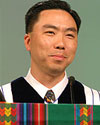The Rev. Jin S. Kim, founding pastor of Church of All Nations in Minneapolis, was unanimously endorsed January 9 by the Presbytery of the Twin Cities Area to stand for moderator of the upcoming 219th General Assembly (2010). The Assembly will be held July 3-10 in Minneapolis.
Kim joins Elder Cynthia Bolbach of National Capital Presbytery as candidates for the top elected post in the Presbyterian Church (U.S.A.). The winner will succeed the Rev. Bruce Reyes-Chow of San Francisco, moderator of the 218th General Assembly.
Kim, 41, was born in Korea and came to the United States with his family in 1975, grow up in a multi-ethnic environment in Columbia, SC and Atlanta. He holds degrees from Georgia Tech (1990), Princeton Theological Seminary (M.Div., 1993), and Columbia Theological Seminary (D.Min., 2005).
He is currently moderator of the Presbytery of the Twin Cities Area, serves as a PC(USA) delegate to the National Council of Churches, and sits on the boards of the Minnesota Council of Churches and the Greater Minnesota Association of Evangelicals. He is also a part of the Jewish-Presbyterian Dialogue and the Special Committee on the Belhar Confession.
Kim speaks widely on the renewal of the church at conferences, colleges, seminaries, presbyteries and congregations, both in the U.S. and abroad. He was a preacher at the 2004 and 2008 General Assemblies, is adjunct faculty at Dubuque Theological Seminary and has also taught at Princeton Seminary, Columbia Seminary, and Duke Divinity School, as well as at seminaries in Brazil, Argentina, Egypt, Russia, and Korea.
His household includes his wife Soon Pac; children Claire Nicea, 10, and Austin Athanasius; and his parents.
On his Web site, Kim reflects on one of his campaign themes: “This is an age that requires a new conceptualizing of leadership. How can churches be re-oriented from institutional management to the kind of leadership that is daring, imaginative, prophetic, countercultural, yet peace-full? In a time when many of the historic mainline churches find themselves on the brink, how might we reinterpret this de-centering as a gift and an opportunity for transformation? Is it possible to lead our local congregations and presbyteries into an embodiment of both radical diversity and deep intimacy that counters the homogenizing and commoditizing impulses of the dominant culture?”

